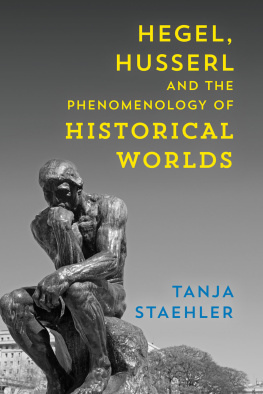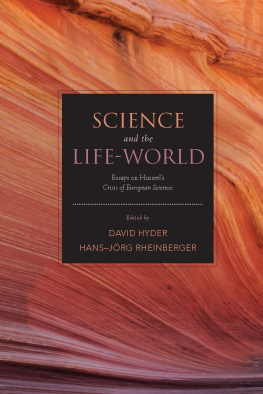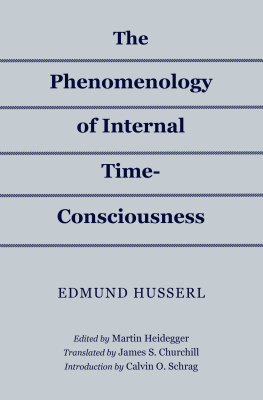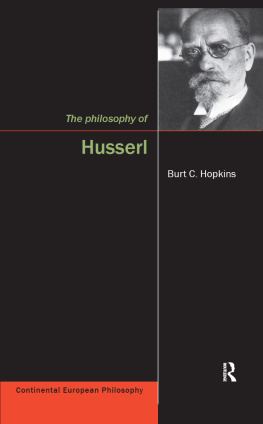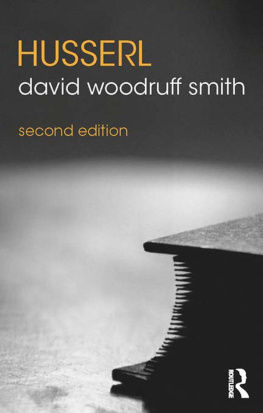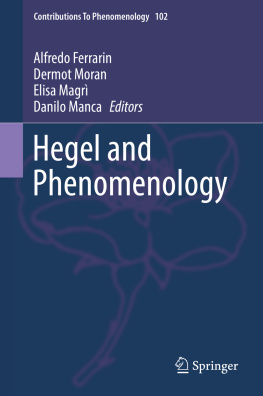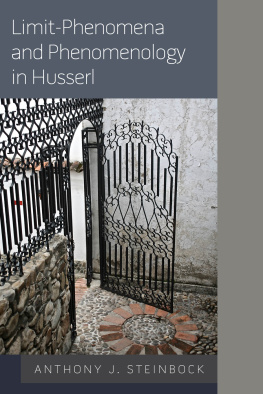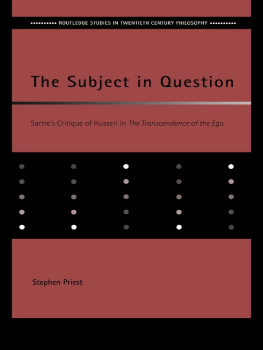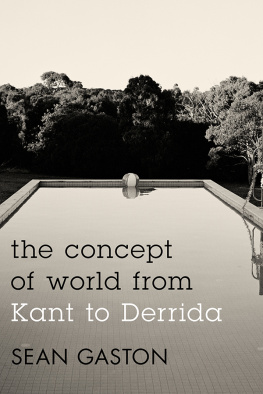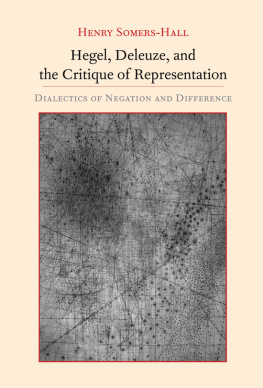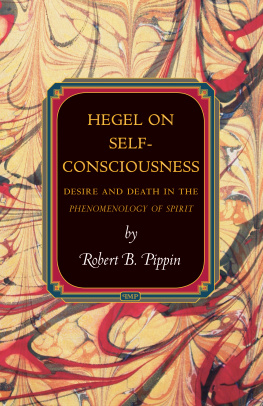Postscript: Heidegger and Merleau-Ponty
If everything good is a matter of heritage.
Heidegger, Being and Time
Husserl had understood: our philosophical problem is to open up the concept without destroying it.
Merleau-Ponty, Signs
It is through their ambiguity that philosophy and history touch.
Merleau-Ponty, Signs
This postscript turns to Heidegger and Merleau-Ponty as two phenomenologists who were strongly influenced by Hegel and Husserl and who shared their interest in the problem of historical worlds. It is obviously impossible to explore their ideas on philosophical beginning in the form of a postscript. An equally impossible task would consist in investigating Heideggers and Merleau-Pontys criticism of Hegel and Husserl. Instead, this postscript aims at opening up some lines of thought regarding the problem of beginning which emerge from the thought of Heidegger and Merleau-Ponty. These thoughts develop and deepen certain questions addressed to Hegel and Husserl which have emerged during the course of the present study.
At certain points in this study, Heidegger and Merleau-Ponty came briefly into play, especially where phenomena of withdrawal and concealment are concerned. Hegel and Husserl, in contrast, embark more explicitly on the quest for (complete) transparency. This creates tensions in their projects, especially concerning the possibility of undertaking philosophy as a science while taking history seriously. Accordingly, this postscript will focus on phenomena which overcome us (such as moods) and which complicate the quest for transparency through the intervention of shadows and ambiguity.
HEIDEGGER ON PHILOSOPHY AND MOODS
Heidegger has commented extensively on Hegels philosophy, especially the Phenomenology of Spirit, and in a different way, on Husserls main concepts. Yet for our topic of moods, these interpretations and commentaries are only partially relevant. Moreover, due to their complexity, these commentaries require a careful discussion which cannot be accomplished here. The situation between Husserl and Heidegger is so intricate that it is not even possible to provide general comments; what seems certain is that their at times rather harsh rejections of the others method and approach cannot be taken at face value but point to a deeper level of mutual indebtedness.
Despite the focus on moods, I will start with a brief reference to one of the most well-known points of critique which Heidegger raises in relation to Hegels concept of time. Time is a difficult topic already because it is such a broad theme, and essential to both Hegel and Heidegger. Furthermore, Heidegger discusses Hegels concept of time in a prominent place, close to the very end of Being and Time. Heidegger claims that he is not criticizing Hegel and that Hegels philosophy of time is very important, especially since Hegels concept presents the most radical and not sufficiently recognized version of the vulgar understanding of time. It is hard to deny that this claim is a form of critique; yet we may presume that in his earlier statement about not criticizing Hegel, Heidegger employs a more traditional or everyday concept of critique.
The most relevant aspect of the discussion, as far as our topic is concerned, is the fact that Heidegger claims Hegels conception of time to be the most radical version of the natural attitude. The arguments Heidegger raises for this claim are too complex to be discussed here; let it suffice to say that the first argument examines how Hegels concept of time is modelled after his concept of space such that time turns into a series of now-points, first reducing the now to a point and then reducing future and past to the now (and thus to a point). If Hegels concept of time is indeed a version of the natural attitude, thus objectifying time, it cannot allow for an existential understanding of time. Accordingly, Hegels concept of history would also not be able to do justice to our human existence in its character of happening (Geschehnis). It is important for Heidegger to outline his own position in relation to Hegel here since his own analysis of historicality (Geschichtlichkeit) culminates in the notion of world history (Welt-Geschichte) which evokes Hegelian associations which Heidegger would reject. Heideggers claim about Hegels conception of time as a version of the natural attitude has various implications; in light of Husserls criticism regarding the natural sciences as a higher version of the natural attitude, it would even become questionable whether Hegels concept of time allows us to enter into philosophy.
Yet despite the fact that Hegel, according to Heidegger, objectifies time, he manages to understand the dynamic process of experience (Erfahrung) very well as a process which we undergo rather than bring about. This passive element is relevant for the question of beginning which Hegel also treats quite appropriately, according to Heidegger. The paradoxical character of philosophys beginning as that which can neither be accomplished from within nor from without becomes manifest in the restlessness of the Absolute. According to Heidegger, absolute restlessness is the character and way in which the Absolute is. Heidegger stresses Hegels important insight that the Absolute is already with us; it would certainly not be in our powers to bring about this experience by ourselves. The relation with the Absolute signifies the most extreme case of an experience which we cannot accomplish; any claims to the contrary would testify to the utmost hubris.
Hegel thus rightly points out that the beginning is something we undergo. Heidegger pursues this line of thought further when he makes a distinction between beginning and outset, a distinction which he ties to the ancient Greeks but which has wider consequences. Outset refers to the coming forth of this thinking at a definite time . The passivity at the core of beginning is thus confirmed.
What is the beginning as that which is to be thought? Heidegger maintains that it is Being which is to be thought, and that the early Greek thinkers began by retreating in the face of Being. In that sense, Husserl and Heidegger might be very close here; but does retreat signify wonder?
The topic of moods will be explored in some detail since it appears to be the most significant corrective which Heidegger brings about in relation to both Hegel and Husserl. Heidegger examines the relevance of moods to philosophy much more thoroughly than Hegel or even Husserl. He also thematizes the relation between different moods wonder, awe, anxiety and others which are to different degrees connected with philosophy. A few general insights from Heideggers phenomenology of moods will be recalled here before turning to the connection between moods and philosophy. In Being and Time, Heidegger shows that our common understanding of moods as subjective and unreliable is superficial and ultimately wrong. Moods are not an occasional experience; rather, we always have a mood, even if this mood is just indifference (which we tend to mistake for the absence of moods). Furthermore, a mood comes neither from outside nor from inside, but arises out of Being-in-the-world. A mood is not just dependent on the subject, on my personality and disposition; otherwise, my moods would be much more stable. Yet moods are not entirely object-dependent either; different people are affected differently by the same object or situation.
Heidegger distinguishes between moods (or everyday moods) and fundamental moods. Fundamental moods are not concerned with a specific object, but with the world which becomes revealed in a certain way. Fundamental moods are moods which determine our world as a whole, and when the mood is revealed to us, it reveals the world. The most prominent mood in

